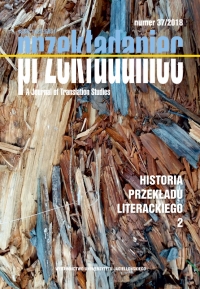Przetłumaczyć świat. Socjotranslatologia według Alicji Iwańskiej
Translating the World. Socio-translation Studies According to Alicja Iwańska
Author(s): Ewa RajewskaSubject(s): Studies of Literature, Ethics / Practical Philosophy, Sociology, Cultural Anthropology / Ethnology, Translation Studies
Published by: Wydawnictwo Uniwersytetu Jagiellońskiego
Keywords: Alicja Iwańska; Translation Studies; sociology; cultural translation; ethics of translation; Mexico;
Summary/Abstract: The article focuses on cultural translation and its ethical consequences according to Alicja Iwańska (1918–1996), a Polish sociologist and writer. In her book Świat przetłumaczony [The Translated World] (1968) Iwańska uses a figure of translator-traitor while trying to translate Mexico conquered by the Spanish to Poland ruined by the Nazis and Stalinists – the book was the literary aftermath of her field work on the culture of Indian Mazahua of a secluded Mexican village. The scientific aftermath of the same research was her anthropological monograph Purgatory and Utopia. A Mazahua Indian Village of Mexico (1971). The first book, written in Polish, was described by the author as “a fictionalized account”, “a literary production”; the second, written in English, was designed as “relatively free from the interference of extra-scientific emotional elements”. For Alicja Iwańska, before the Second World War a philosophy student under prof. Tatarkiewicz, translating a culture is an ethical problem; the complex relations between truth, falsity and fiction in intercultural translation are coupled with the issues of expressibility in a specific narrative (literary versus scientific) and a specific language (Polish versus English). Iwańska’s books, read again after 50 years from their creation, seem to be a forgotten link of the Polish translation theory.
Journal: Przekładaniec.
- Issue Year: 2018
- Issue No: 37
- Page Range: 7-18
- Page Count: 12
- Language: Polish

